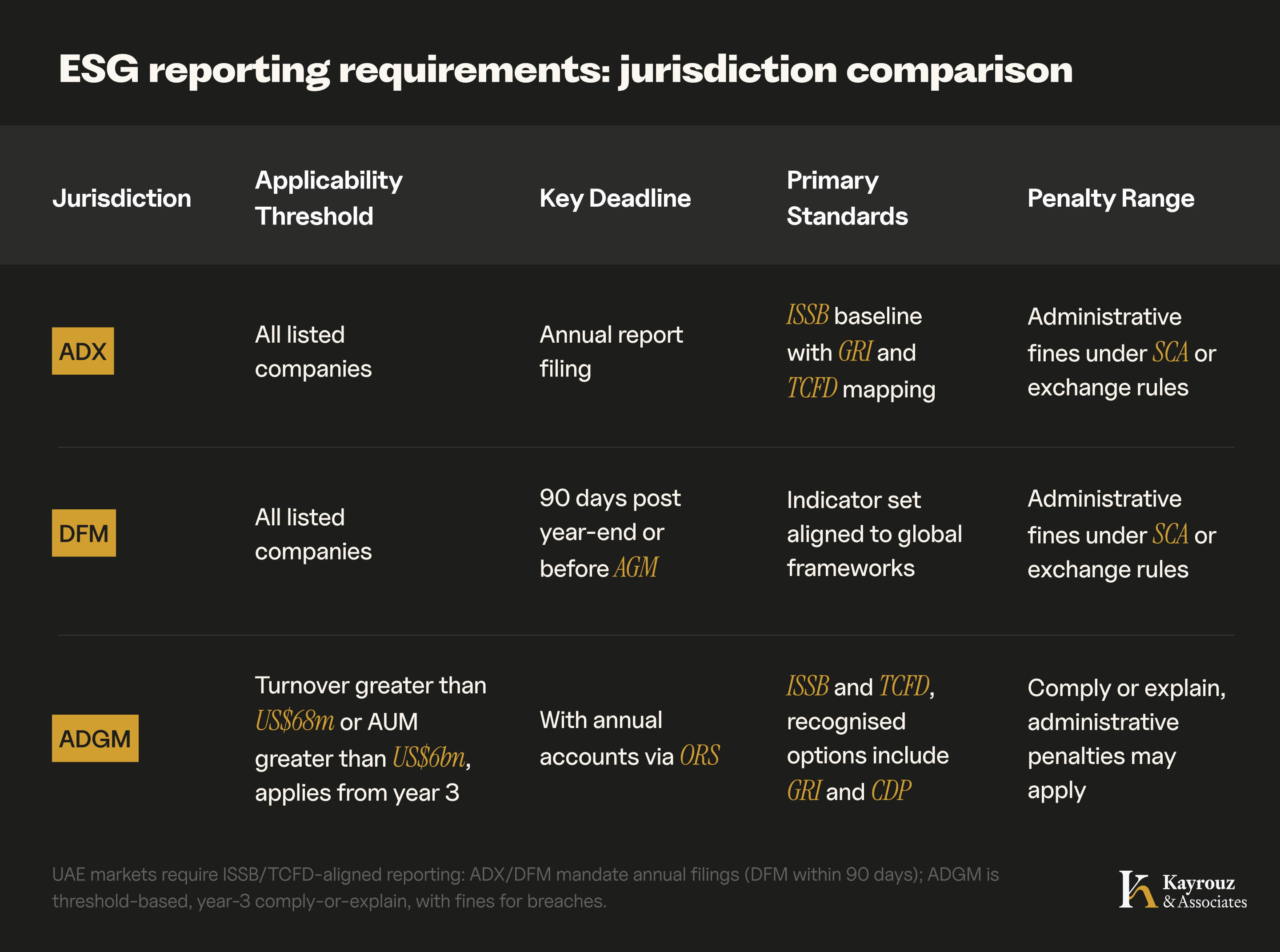- For onshore UAE listed companies on ADX and DFM, annual sustainability reporting is mandatory and must be filed within 90 days of financial year-end or before the AGM, whichever is earlier.
- ADGM’s ESG Disclosures Framework applies by year 3 after incorporation to companies crossing US$68m turnover or FSRA asset managers with AUM greater than US$6bn and is filed with annual accounts via ORS. See the official ESG Disclosures Framework.
- The new UAE Climate Law, Federal Decree-Law No. 11 of 2024, adds a separate, nationwide layer: mandatory GHG measurement and reporting with fines from AED 50,000 up to AED 2,000,000 for non-compliance. Effective May 30, 2025 with full compliance by May 30, 2026. Helpful primers: PwC overview and Anthesis summary.
The landscape of environmental, social, and governance reporting in the UAE has shifted dramatically over the past five years. What began as voluntary guidelines has evolved into a complex web of mandatory requirements that now shape how businesses operate across the Emirates' three major financial centers.
For corporate counsel and executives navigating this transformation, understanding the distinct yet overlapping frameworks governing ADX, DFM, and ADGM entities has become essential. The stakes are higher than many realize, with compliance failures carrying both financial penalties and reputational risks that can reshape market positioning overnight.
The Regulatory Convergence
The UAE is using ESG reporting rules to become the region's leading sustainable finance center. All listed companies must now provide detailed ESG reports, aligning with international standards such as the Global Reporting Initiative and the Sustainability Accounting Standards Board, marking a significant departure from the voluntary disclosure era. The direction of travel is toward comparability and investor usefulness, with growing reference to the ISSB baseline.
These new rules go beyond simple compliance. The UAE recognizes that sustainable business practices are now essential for long-term success. Business leaders must figure out how to implement ESG reporting effectively while managing the complexity. See also the UN SSE note on the ADX guidance for broader context: SSE announcement.
ADX Framework: The Foundation
The Abu Dhabi Securities Exchange established the template for UAE ESG reporting through its comprehensive disclosure guidelines. For listed entities, the requirements extend beyond simple checkbox exercises. Companies must demonstrate genuine integration of sustainability considerations into their business models and strategic decision-making processes.
Key ADX ESG Disclosure Requirements
- Environmental Metrics: energy consumption, water usage, waste management, and greenhouse gas emissions reporting
- Social Impact Indicators: employee diversity statistics, health and safety performance, community investment programs, and human rights policies
- Governance Structures: board composition and independence, executive compensation frameworks, anti-corruption policies, and stakeholder engagement processes
- Climate Risk Assessment: physical and transition risk analysis, scenario planning, and adaptation strategies
- Sector-Specific KPIs: industry-tailored metrics that reflect material sustainability risks and opportunities
The ADX framework emphasizes transparency in three critical areas, environmental impact measurement, social responsibility initiatives, and governance structures. Companies face particular scrutiny over climate-related financial disclosures, with regulators expecting detailed analysis of how environmental risks affect business operations and long-term viability.
What distinguishes the ADX approach is its focus on sector-specific metrics. Energy companies face different disclosure requirements than financial services firms, reflecting the regulator's understanding that meaningful ESG reporting must account for industry-specific risk profiles and operational realities.
DFM Requirements: Market-Driven Compliance
The Dubai Financial Market has taken a complementary but distinct approach to ESG disclosure. While maintaining alignment with international standards, DFM requirements reflect Dubai's position as a global business hub where diverse multinational corporations seek market access. Companies must address a structured indicator set, creating a more prescriptive framework than some international counterparts. This specificity provides clarity for compliance teams but requires careful attention to data collection and verification processes.
The DFM's emphasis on forward-looking sustainability commitments sets it apart from purely historical reporting models. Companies must articulate clear sustainability targets and demonstrate progress toward achieving them, creating accountability mechanisms that extend beyond traditional financial reporting cycles.
ADGM: The Frontier of Sustainable Finance
Abu Dhabi Global Market has positioned itself at the forefront of sustainable finance regulation through its ESG Disclosure Framework. The framework applies to companies with turnover exceeding US$68 million or FSRA licensed fund managers with assets under management exceeding US$6 billion, establishing clear materiality thresholds. It sits within a broader sustainable finance ecosystem, including ADGM’s Sustainable Finance Regulatory Framework.
The ADGM framework represents a sophisticated approach to ESG regulation in the region. Its sustainable finance regulatory framework comprises comprehensive ESG disclosure requirements, setting standards that other jurisdictions are now studying for potential adoption.
What makes ADGM's approach particularly significant is its integration of ESG requirements with broader sustainable finance initiatives. The framework does not exist in isolation but forms part of a comprehensive regulatory ecosystem designed to attract and support sustainable finance activities across the region.
New overlay: the UAE climate law
The Climate Change Law now requires entities across the UAE, including free zones, to measure and report GHG emissions through a MOCCAE platform. Penalties range from AED 50,000 to AED 2,000,000, with stricter treatment for repeat violations. Regulatory timing, issued August 28, 2024, in force May 30, 2025, and full compliance by May 30, 2026.
This is separate from exchange-level ESG reports. Treat it as a compliance track of its own with inventory, verification, and registry obligations that may require third-party assurance for higher emitters.
Cross-framework cheat sheet

Compliance Intersection Points
The challenge facing many UAE businesses lies in managing compliance across multiple frameworks simultaneously. Companies with operations spanning different emirates and financial centers must navigate overlapping requirements while avoiding duplicative reporting burdens.
Common ESG Compliance Challenges
- Data Standardization, reconciling different measurement methodologies across ADX, DFM, and ADGM requirements
- Timing Coordination, managing staggered reporting deadlines and update requirements across multiple jurisdictions
- Resource Allocation, balancing compliance costs against strategic ESG investment opportunities
- Stakeholder Communication, ensuring consistent messaging across different regulatory disclosure formats
- Third-Party Verification, coordinating external assurance processes to meet varying audit requirements
Jurisdiction comparison
The table below replaces earlier drafts that contained a DFM market-cap threshold and an ADGM revenue-based penalty, which were not accurate.

Smart compliance strategies focus on identifying commonalities across frameworks rather than treating each as a separate obligation. Most international standards like GRI and TCFD provide a sufficient foundation for meeting requirements across all three jurisdictions, though specific formatting and submission requirements vary.
The key insight emerging from our practice is that successful ESG compliance requires early integration into business planning cycles. Companies that treat ESG reporting as a year-end exercise consistently struggle with data quality and strategic alignment issues.
Legal Risk Management
From a legal perspective, ESG reporting failures present multiple risk vectors that extend beyond immediate regulatory penalties. Market disclosure obligations create potential liability exposure for inaccurate or incomplete reporting, particularly where investors rely on ESG metrics for investment decisions.
The enforcement landscape continues to evolve, with regulators demonstrating increasing sophistication in identifying and addressing compliance gaps. Recent enforcement actions suggest that regulators are moving beyond technical compliance checks toward substantive evaluation of ESG integration quality.
Professional liability considerations also warrant attention. As ESG expertise becomes standard practice expectation, legal advisors face potential exposure for inadequate guidance on corporate governance requirements or strategic implications of disclosure decisions. For further reading, see Al Tamimi’s note, The rise of ESG in the UAE, mandatory ESG reporting for UAE listed companies.
Strategic Implementation Framework
ESG compliance works best with a clear plan that starts with understanding what matters most to your business. Companies need to identify which ESG factors actually impact their operations and stakeholders.
Teams from finance, operations, legal, and strategy should work together on this assessment. This teamwork ensures ESG reporting focuses on real business priorities instead of generic sustainability topics.
Good data management is crucial. Companies must have reliable systems to collect, check, and analyze ESG information across their operations. The quality of this data determines both compliance success and business value.
Technology and Automation Opportunities
Forward-thinking companies are leveraging technology platforms to streamline ESG data collection and reporting processes. Automated data capture systems reduce manual effort while improving accuracy and consistency across reporting periods.
The integration of ESG reporting systems with existing financial and operational reporting platforms creates efficiency gains while ensuring data consistency across different disclosure requirements. This technological integration also supports real-time monitoring of ESG performance indicators. For broader context on regulatory momentum, see this short guide to ESG regulation, 2024 guide to ESG regulation.
Future Regulatory Direction
The trajectory of UAE ESG regulation points toward increased harmonization with international standards and expanded scope of covered entities. Emerging proposals suggest that ESG reporting requirements may extend to smaller companies and private entities over the coming years.
Climate-related disclosures are receiving particular regulatory attention, with expectations that companies will provide increasingly detailed analysis of physical and transition risks associated with climate change. This trend reflects global regulatory momentum toward comprehensive climate risk assessment and disclosure.
The integration of artificial intelligence and machine learning technologies into ESG reporting processes presents both opportunities and regulatory challenges that will require careful navigation as standards continue to evolve.
Practical Recommendations
Based on our experience advising UAE businesses on ESG compliance, several practical recommendations emerge for companies seeking to optimize their approach to these requirements.
Essential ESG Compliance Steps
- Establish Dedicated Governance, assign ESG reporting responsibilities to specific board members and executive teams with clear accountability structures
- Implement Comprehensive Data Systems, deploy technology platforms capable of collecting, validating, and analyzing ESG performance data across all business units
- Engage Professional Advisory Services, work with legal counsel and ESG consultants to ensure compliance strategies align with business objectives and regulatory expectations
- Develop Stakeholder Communication Plans, create consistent messaging frameworks that address investor, regulator, and public disclosure requirements
- Plan for Continuous Improvement, establish review processes that enable ongoing refinement of ESG reporting quality and strategic integration
First, establish clear governance structures that assign ESG reporting responsibilities to specific individuals with appropriate authority and resources. ESG compliance cannot be treated as an administrative afterthought but requires dedicated leadership attention.
Second, invest in robust data management systems that can support multiple reporting frameworks simultaneously. The cost of implementing comprehensive data governance typically pays for itself through reduced compliance effort and improved strategic decision-making capabilities.
Third, engage with legal counsel early in the ESG planning process rather than seeking advice only when compliance deadlines approach. Proactive legal guidance can identify strategic opportunities and risk mitigation strategies that reactive compliance efforts often miss.
Looking Forward
The UAE's ESG reporting landscape will continue evolving as regulators refine their approaches and international standards advance. Companies that view these requirements as strategic opportunities rather than compliance burdens position themselves for sustainable competitive advantages.
The integration of ESG considerations into core business processes represents a fundamental shift in how successful companies operate in the modern economy. Those who embrace this transformation thoughtfully and systematically will find themselves better positioned for long-term success in an increasingly sustainability-conscious marketplace.
For businesses operating across the UAE's diverse regulatory landscape, the message is clear, ESG reporting has moved from optional disclosure to mandatory strategic planning. The companies that recognize and adapt to this reality today will be the ones that thrive in tomorrow's sustainable economy.
Pierre Kayrouz is Chief Legal Officer at Kayrouz & Associates, with more than 24 years in litigation and arbitration. Georges Touma is Head Litigator with nearly two decades in civil, commercial, and real estate law. Both advise on regulatory compliance and corporate governance across the UAE. See our Public Companies and Corporate Governance service page: Public companies and corporate governance.
For guidance on ESG compliance and regulatory matters, contact Kayrouz and Associates at [email protected] or +971 4 8761744.
Related services
- Energy Law and Regulatory Defence, service page
- Corporate and Commercial Law, service page
Your success starts with the right guidance.
Whether it’s business or personal, our team provides the insight and guidance you need to succeed.


